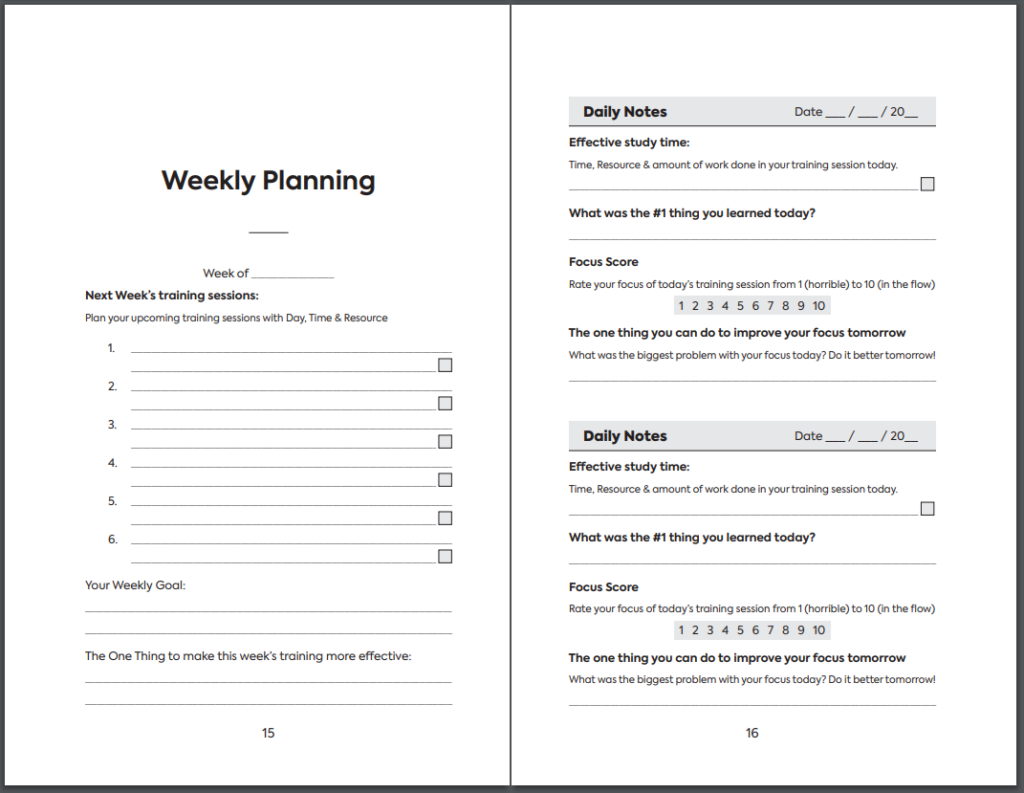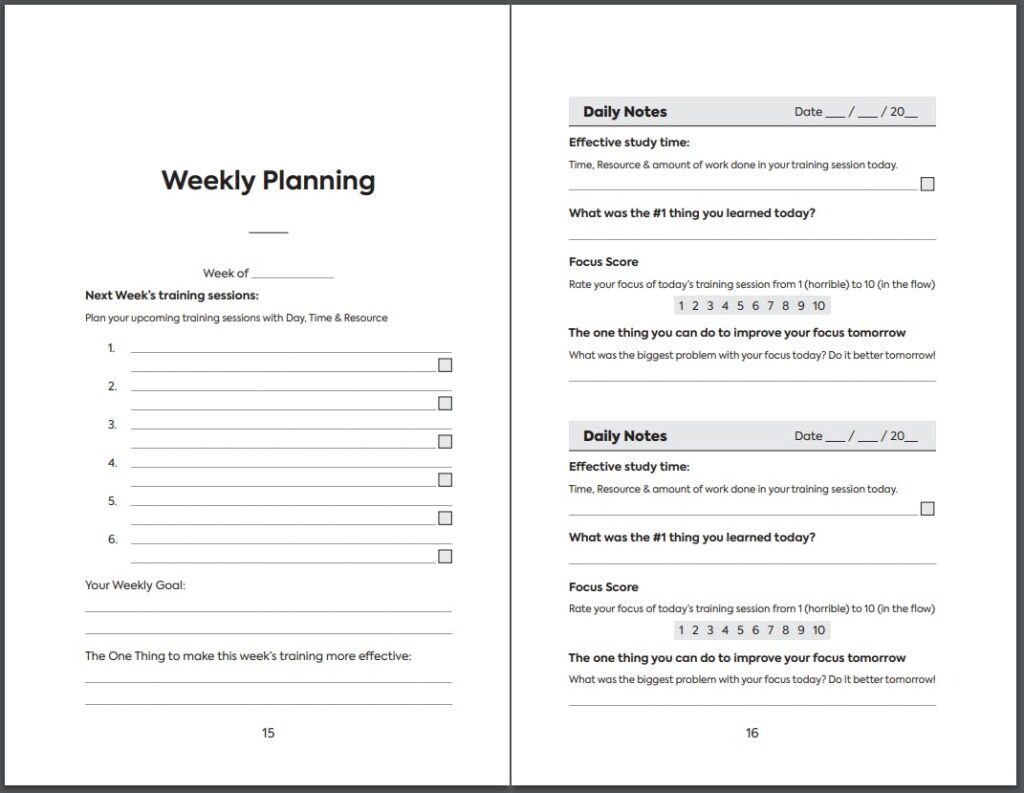This is Day 3 of my 7-Day series to kickstart your Chess Training. Each part stands on its own, but they are the most powerful if you read and apply all 7 days consecutively.
- Day 1 – The Chess Detox
- Day 2 – Mastering Mindset: Shift From Rating Goals to Skill Improvement
- Day 3 – Transforming Your Chess: The Power of Hard Training
- Day 4 – Strategic Chess Training: Maximize Impact With The 80/20 Principle
In the past 4 Articles, you’ve started working on your bad habits, created a more healthy mindset, done some hard stuff, and learned how to use the 80/20 rule to your advantage.
That’s fantastic, but all of it will be in vain if you don’t do the simplest yet hardest thing:
Sit down and do the work. Consistently. Easier said than done.
“If more information was the answer, we’d all be billionaires with perfect abs” – Derek Sivers
As you know by now, what helps us improve is usually not the most comfortable task. It is hard. Sometimes annoying. And involves failure. Not something we’re naturally drawn to.
And if you are anything like me, if you don’t have a plan for your day, at any given moment, you most likely choose the easy, comfortable activity (short-term) over the hard but useful & meaningful one (long-term).
That’s why we need plans. A good, realistic plan sets you up to actually do the things you want to do.
I’ve written training plans for 7+ years now and help others do the same. The results, not only in rating gains but also in general happiness and excitement for your chess study are staggering.
Kalea Chapman, a Next Level Training student says:
“When I sit down to train now, I know exactly what I’m going to work on and I have confidence about the material… I’ve never been happier with my training”
Now, in a moment, I will guide you through setting up your first chess plan for 2024. But before that, let’s briefly discuss what makes a plan good or bad.
Good Plans Are SMAR(T)
The acronym SMART is often used when setting goals. But it applies as well to plans:
- S for Specific -> Specify the Training time & resources beforehand
- M for Measurable -> Make it easy to say “done right or wrong.”
- A for Achievable -> Don’t plan insane amounts of time you anyway won’t be able to invest into chess training
- R for Relevant -> Work with the 1/3 rule to keep your training relevant and smart
- T for Time-Bound -> Clarify how long your study sessions will be
Here is a common example of a non-SMART chess plan:
On Mondays, I study Tactics; on Tuesdays, Openings; on Wednesdays play some games, and so on…
Instead, your plan should look like this:
Monday 6.30-7 PM Solving 12 Tactical Exercises in Step Method 2, Page 35
Tuesday 5.30-6.30 PM Playing 2 10+5 Rapid Games followed by Analysis of the games
The goal of a plan is to think ahead and decide to train beforehand. If your plan lacks any of the SMART characteristics, it becomes more likely that you mess up the plan.
Create Your First Plan
Now, let’s create your first SMART plan for 2024 together.
Step #1: Amount of Training Time
Think about your average week. How many hours will you be able to invest in chess improvement?
Write this number down.
Now divide it by 3 (and round it). That is the amount of time you will invest in your first week. Starting slow will help you build confidence in your skills to really stick to your training plan. Whenever you tick off all planned sessions in a week, you can increase your plan by 30-60 minutes for the next week.
Step #2: Fitting Chess Training Time Slots
In spirit with the slow & consistent method, I recommend you split your weekly time over six days. The seventh day will serve as a chess-free day to help you recharge and become motivated for the next session.
Look in your calendar and find slots that fit well for chess training. It is best if these slots are the same for each week. If you have a less stable work schedule, just check your first week of January and adapt your plan for later weeks.
Let’s say you’ve written down 20 hours as your ideal goal. A third of it means you’ll roughly study 7 hours in your first week. You can split those 7 hours into 5x 1-hour sessions and 1x two-hour session (on the weekend, maybe?).
Now, write down your time slots. The more of a routine this can become, the better. But also feel free to test out different times to find out when you are the most focused.
Step #3: Fill Your Chess Training With Relevant Things
Use the 1/3 rule to plan what exactly you will do in those time slots beforehand. To keep it simple, I recommend:
- 2 Tactics sessions
- 2 Play + Analyzing Sessions
- 2 Sessions of either Openings, Endgames or Strategy
Pick one resource for each third and stick with that one for week one. For example:
- Lichess Tactics (or Step Method Books) for Tactics
- Lichess or Chess.com for playing games (or games at your local club!)
- One book/course that helps you improve Openings, Endgames, or Strategy
You’ve got your first plan ready for a successful 2024. Congratulations.

I hope over time working with such a training plan will make you a more successful and happier chess improver, just like Kalea and many other Next Level Training students.
If you want to go into the details of a great chess plan and know exactly which resources are amazing for your level, make sure to check out Next Level Training.
Now it is time to put your plan somewhere you see it often and start working on your chess the right way beginning with the first week of January. I can’t wait to hear what you all will be able to achieve in 52 weeks of a great 2024
But let me tell you: even with the best plan, you will miss some sessions in 2024. That’s okay. Preparing for such misses & roadblocks will be the topic of tomorrow’s Newsletter.
Keep improving,
Noël
Want to read on? Day 6 – Resilient Chess Training: Navigating Setbacks for Consistent Progress
